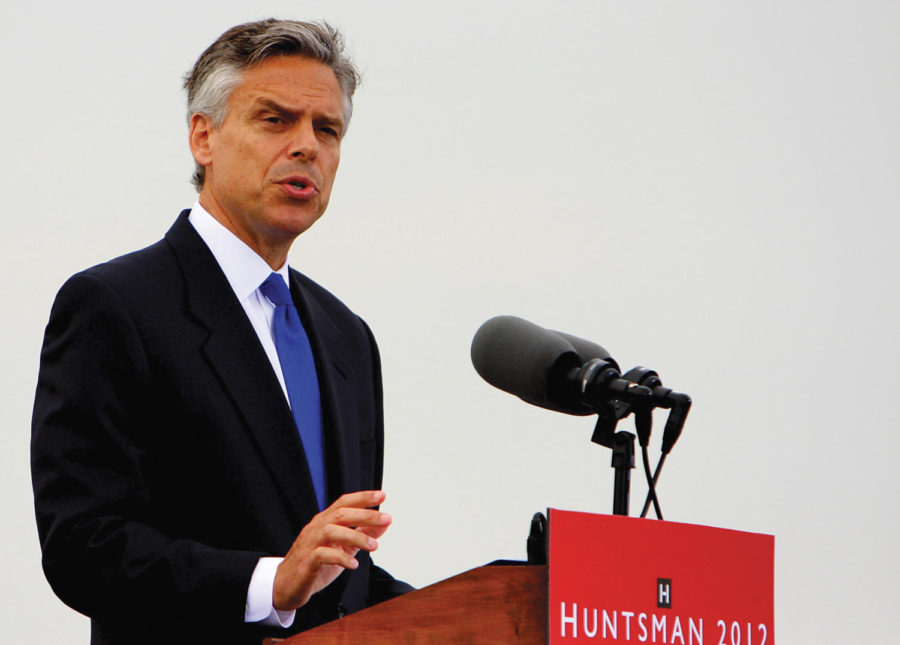Belding: What if all the politicians went on strike?
Erika Dimmler/CNN
Jon Huntsman, the former U.S. ambassador to China, launches his presidential campaign June 21 at Liberty State Park in New Jersey. Hunstman is one of the few politicians left who is committed to debating the issues and compromising with other parties in efforts to move forward.
January 23, 2012
Perspectives on American politics, policy and economics increasingly come from the libertarianism of Ayn Rand. Over the past few years now, Republicans have emphasized deregulating economic activity and lowering taxes to restore economic growth. The best articulation of those ideas is within the pages of “Atlas Shrugged,” Rand’s monumental 1,000-page novel.
Another idea that has been kicked around recently by some politically minded individuals — and was a central theme of “Atlas Shrugged” —was the question of what would happen to everyone who works for someone else if all the owners of productive businesses disappeared. What would the rest of us do if everyone with any ability to create jobs, wealth or goods went on strike and refused to work?
In October, one tea party activist quoted language from “Atlas Shrugged” and urged small business leaders to not hire any new workers until the Obama administration and Democrats in Congress stopped their “class warfare against our constitutional republic’s heritage of individual rights, free market capitalism and indeed our Constitution itself, with the ultimate goal of collapsing the U.S. economy and globalizing us into socialism.”
Truly, the effects of every productive economic actor refusing to work would be a catastrophe. Lower-level corporate officers would have to learn the jobs of their former superiors and stumble about as they did so, the same way Eddie Willers learned Dagny Taggart’s job in “Atlas Shrugged.” The rest of us would probably have to reject a consumer economy and become the country of small producers that we were centuries ago.
What I want to know, however, is this: What would happen if America’s politicians went on strike? What if all the politicians who were interested in debating the issues, entertaining ideas put forth by other parties and compromising to move forward even a little refused to do so because their colleagues were too much ideology and not enough personality? What if we lost every politician who wanted to work with his colleagues instead of show up and cast votes he decided on long ago?
Unfortunately, there is little indication from today’s American politics of what that answer is. We have few, if any, remaining politicians. Plenty of ideologues, to be sure, swamp us with their visions that either incorporate their observations of the world or exclude them.
Some members of Congress are retiring outright in their frustration at our increasingly extreme politics. Sen. Kent Conrad, D-North Dakota, said when he announced his retirement that running a political campaign this year would be too much of a distraction from solving budgetary problems. Sen. Jim Webb, D-Virginia, said outright that he does not want to devote his whole life to politics.
But ideologues dominate politics more than ever before. Ron Paul believes the United States should be a free-market country. Rick Perry believes the United States should continue to be the free agent of an exceptional country that it was; he combines that with elements of Paul’s classical liberal economic vision. Rick Santorum believes the United States — and governments generally — should enact biblical laws and, to borrow some of Woodrow Wilson’s language, make the world safe for Christianity if they cannot actually make it Christian.
If he did not carry so much repulsive moral baggage — it makes no difference whether it is real or imagined, since people act on it anyway — Newt Gingrich would be a good politician. His ability to solve problems one way for fact pattern A and a second way for fact pattern B is legendary. His ability to move on from the solutions to dormant sets of facts is also legendary.
The real politician of this election season was Jon Huntsman, and we lost him. Like several of the representatives and senators retiring from Congress this year, he seems frustrated with the lack of honesty about the political process. He seems disillusioned with ideological warfare that avoids good faith confrontation of the facts and working with other people, even if they have different capital letters after their names, in equally good faith. For the most part, Huntsman refused to make his presidential campaign one of Us vs. Them.
If you asked me what would happen if America’s politicians went on strike, I would say that the effects would correspond to what would happen to religion if all the clergy stopped preaching and mentoring, what would happen to morals if all the parents stopped parenting — and what would happen to the economy if all the producers stopped producing.
What would happen if all the politicians went on strike?
The best answer may be, “Who is John Galt?”







